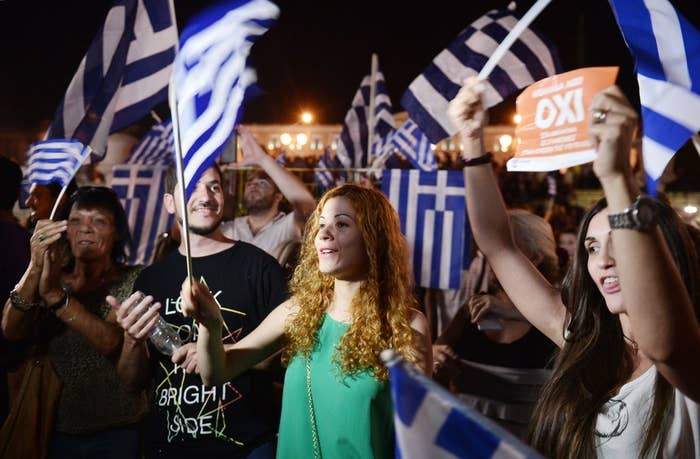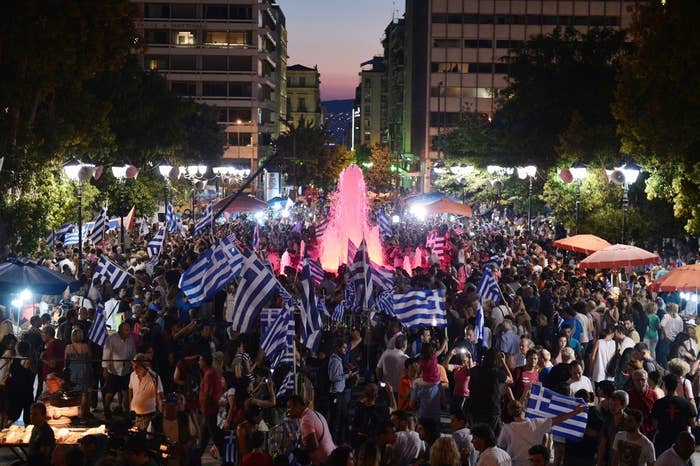
"This is a wonderful moment. We really don't know what's going to happen, but at least we have a better chance," said student Marina Basedekis, 33, as she celebrated the Greek people's decision Sunday to reject further austerity measures in a national referendum. "We saw for five years [of austerity] what it would mean to vote 'Yes.' I don't know if this government is the right one but this is the best option."
As hundreds of jubilant "No" voters swarmed into Athens' Syntagma square, the site of countless demonstrations over the last six years of the Greek debt crisis, there was a mixture of options as people chanted anti-austerity slogans in the warm summer evening: astonishment that their side had won, fear of what comes next, and a widespread sense among "No" voters that they can finally be proud of their nation again.
"It is even better than expected," said artist Sula Repani. "The war against democracy [in the referendum] was very dirty and unhappy. But the Greek people, we prefer to not have money than to have no respect. I understand why we said 'No': We said, 'Respect our country!'"
Repani had not previously been involved in politics, but she is one of many here who were brought around to the left-wing Syriza government by what she perceived to be the injustice of the EU imposing further austerity measures on her country. "Greece was in a bad situation, but it is not right to punish a country in this way," she said.
The strange mixture of groups at the celebration showed the wide coalition that Syriza has built in order to gain the support of some 60% of voters for a new deal. At Sunday's celebrations outside the Greek parliament, a small phalanx of teenage anarchists marched along the street dangling their distinctive black-and-red flags, just a few yards from where a small group of Trotskyites claimed victory for the international working classes, while large numbers of middle-class students celebrated by walking around the square with cans of beer and kebabs in their hands.

Karoline, a 27-year-old unemployed architect, said she knew a "No" vote could result in Greece leaving the eurozone, but said it was a risk worth taking in order to restore national pride. "We don't know what's going to happen but feel we have trust in our government and we don't have trust in not the European Union," she said. "It is unacceptable for the European Union to treat people like this."
Support for the euro remains very high in Greece, but Syriza successfully convinced the population that they could still vote "No" without risking a Greek exit from the currency.
"Leaving the eurozone is not ideal," said Karoline. "Most of the people who voted 'No' did not want to leave the EU or eurozone, they just want to affirm their rights."
It was also a rare chance for Yiannis Chalas, a teacher and member of the Fourth International communist group, to celebrate victory for his movement. "The circumstances under which this referendum was held was of blackmail with continuous propaganda by the media," he said. "It is very important that in almost every part of Greece there was a majority of votes for No. Our people reject the policy of austerity."
"We believe that this is an illegal debt that does not belong to the people, it belongs to capitalists and bankers," he said. "Our people were humiliated for five years."
George Stasinopoulos, a 25-year-old actuary, said he was worried about the future, but had faith in the Syriza government. "I feel worried but I believe that this government will be better," he said. "Our previous prime ministers destroyed this country but this prime minister, Tsipras, offers hope for Greece."
"The Greek TV channels and the banks told lies but we decided to vote 'No' and I believe all Europeans support us," Stasinopoulos said. "This day is historical for Europe. We want another Europe – a Europe for people."

